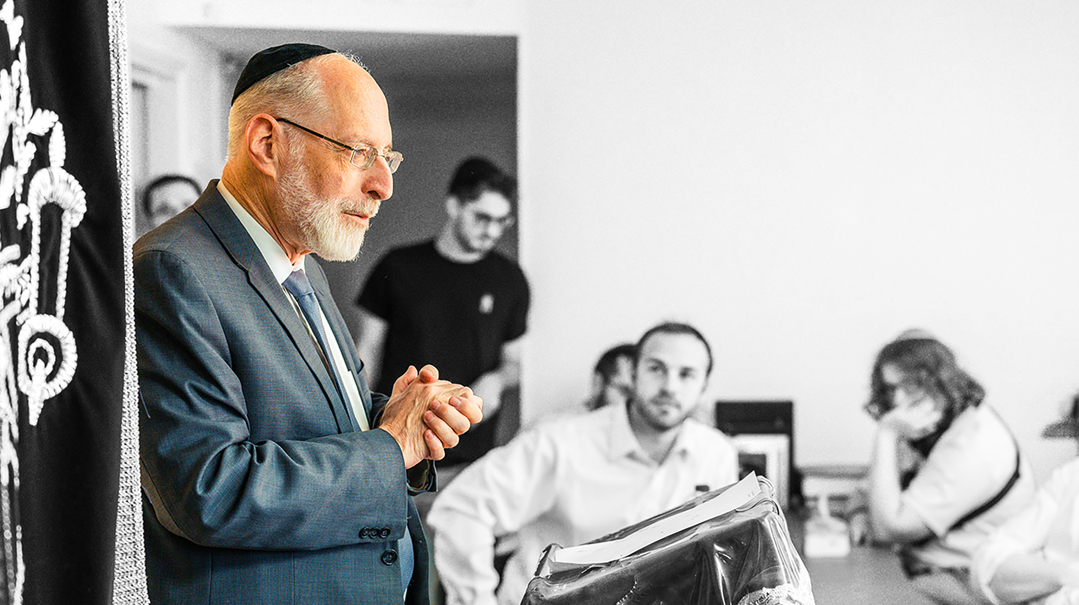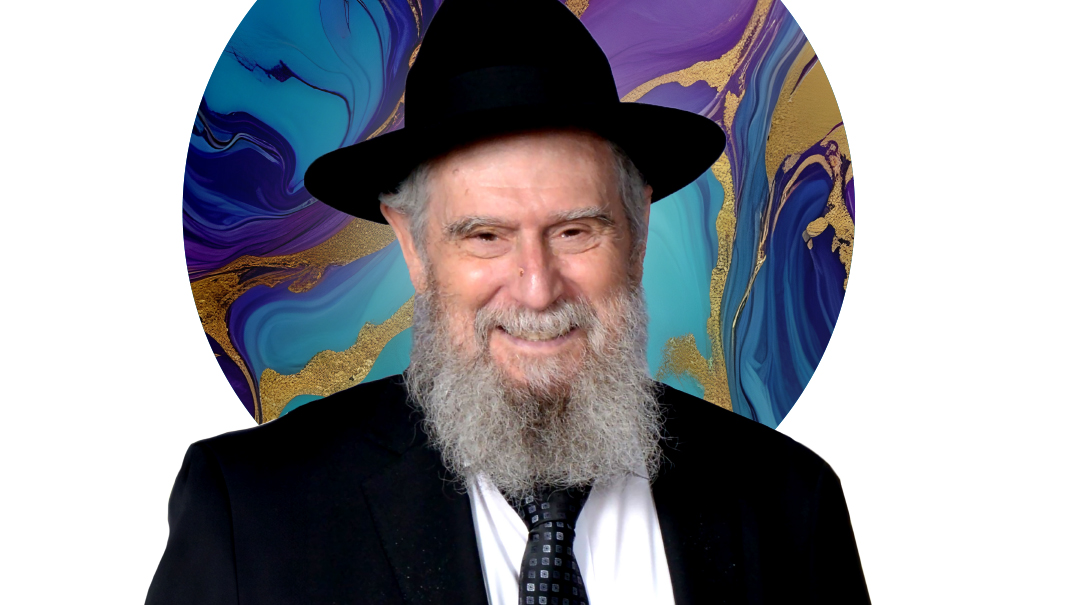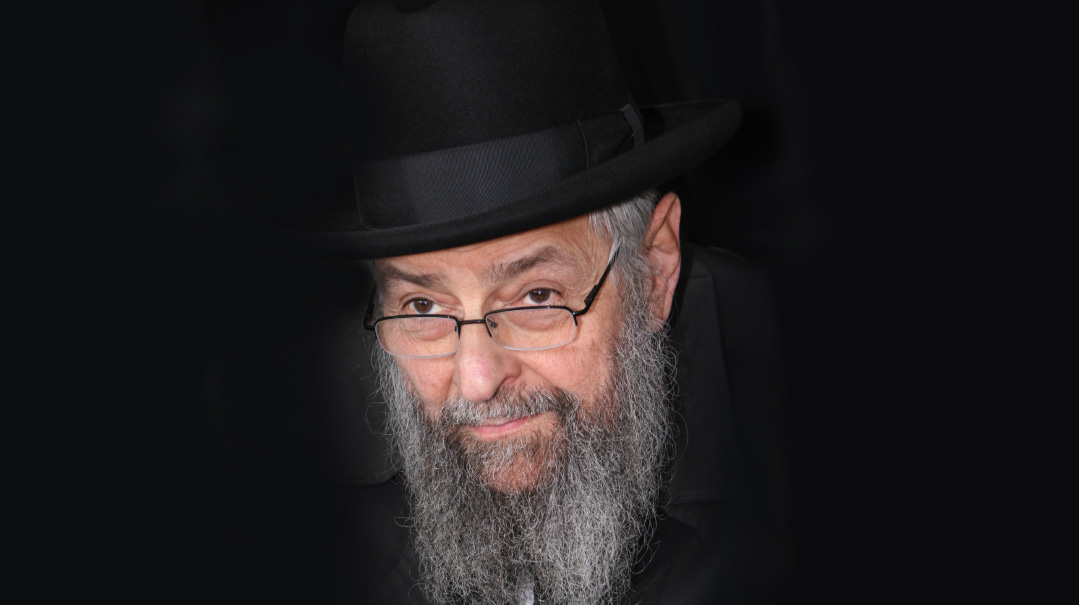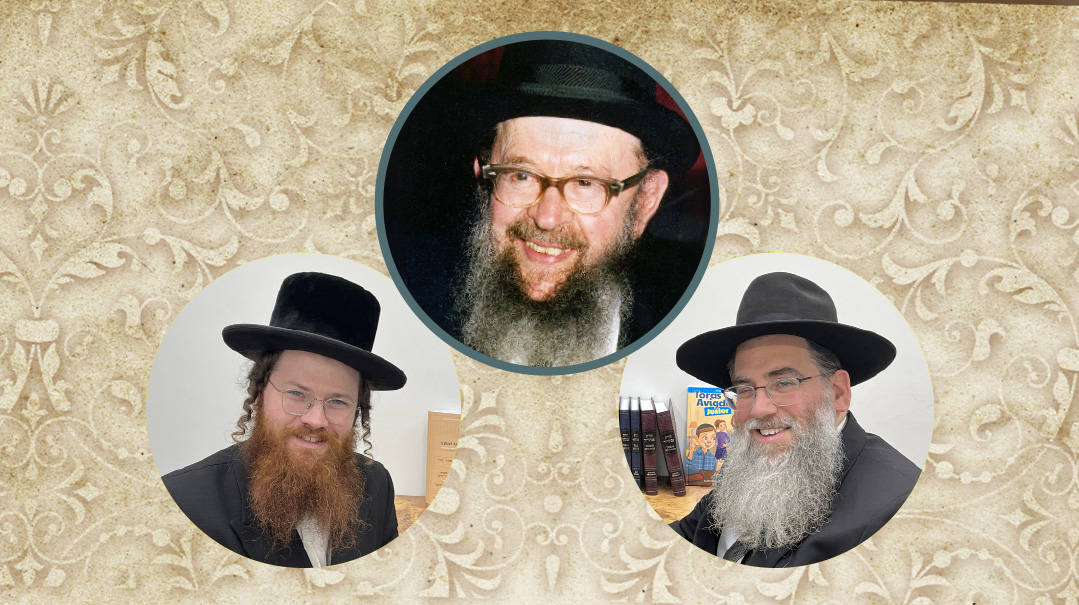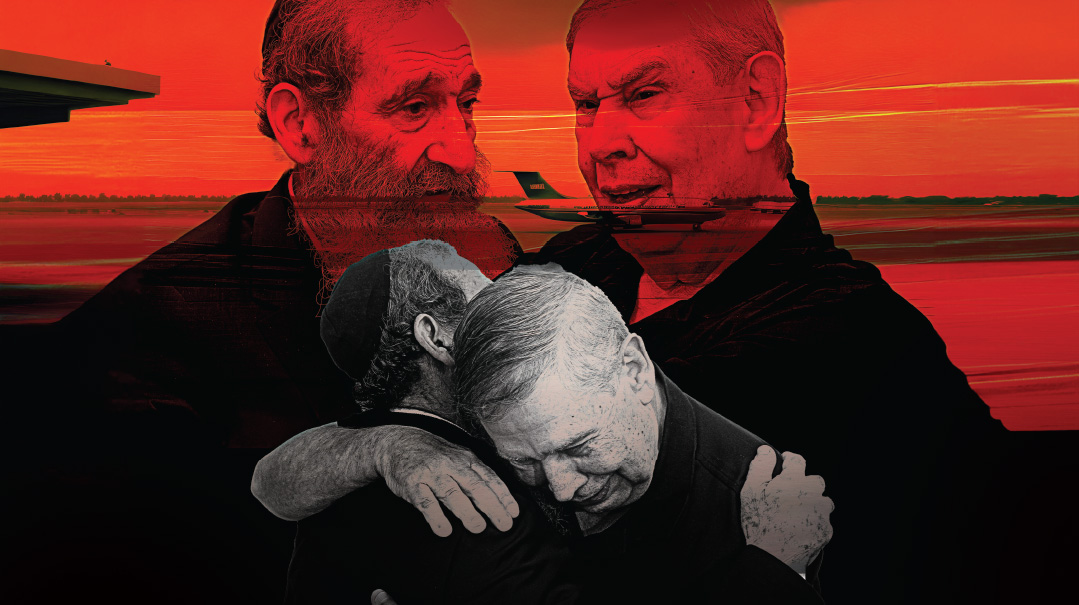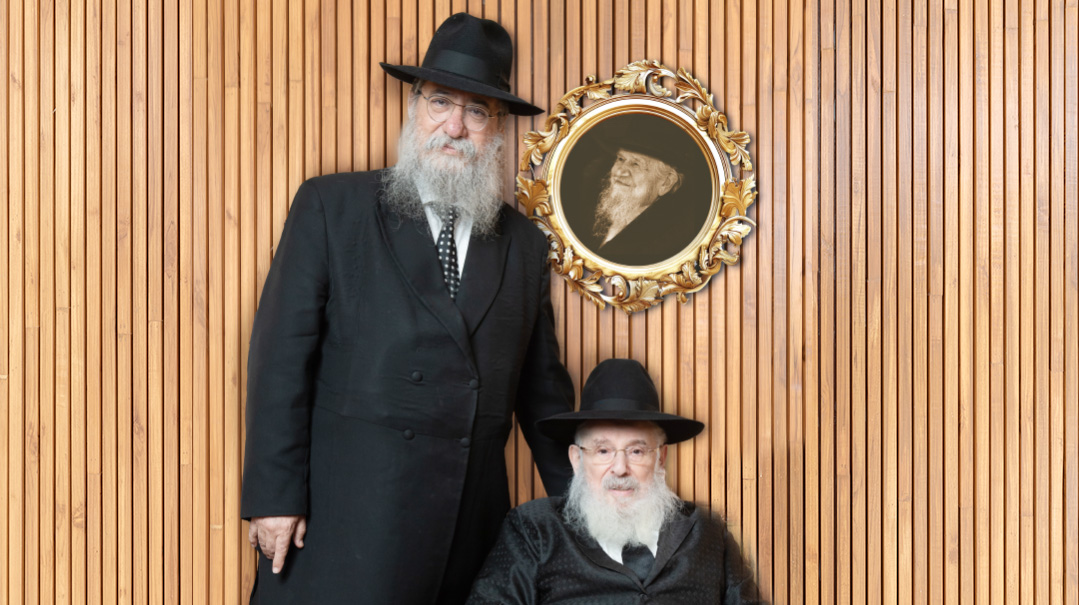Mission Abroad
| June 20, 2023Enduring encounters from Rav Dov Landau’s chizuk mission
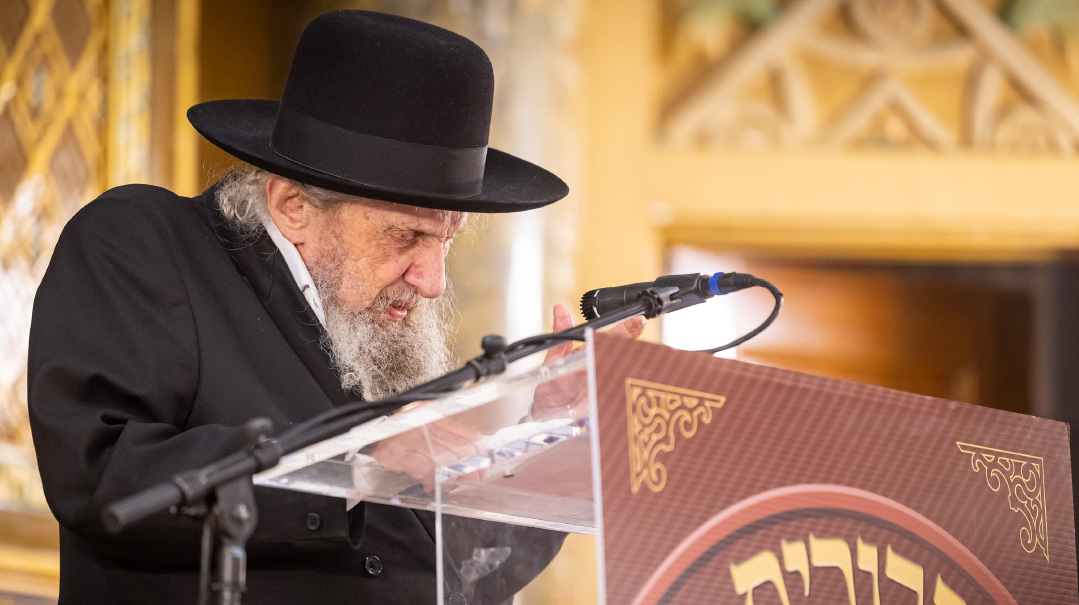
Photos: Mattis Goldberg, Naftoli Goldgrab, AEGedolim, YH
IN Slabodka and beyond, everyone knows that for 93-year-old Rosh Yeshivah Rav Dov Landau, there’s no time for public appearances, meetings, or events. Even talmidim in search of advice, and visitors and askanim hoping for a brachah, know they’ll have to catch the Rosh Yeshivah between his many daily chavrusas. That’s why it was an unusual — and joyous — surprise that the Rosh Yeshivah agreed to travel to the US for a week of chizuk and to attend the massive Adirei HaTorah event at Wells Fargo Center in Philadelphia earlier this month. (It was actually his second chizuk trip — the first was in October of 2021, the first time he’d been out of Eretz Yisrael since arriving with his family from Poland as a seven-year-old child.)
Reb Dov, as he’s affectionately known, is one of the greatest, living talmidei chachamim, a grandson of Slabodka founder Rav Eizik Sher, scion of Strikov chassidus, talmid muvhak of the Chazon Ish. Reb Dov is far from a practicing chassid — he’s the quintessential Chazon Ish’nik — yet Slabodka has many chassidish talmidim, and several times a year he will invoke the Strikover and Vorka minhagim of his youth. In conversation, he’ll often quote a chassidish vort and incorporate historical details, alongside the mesorah he received from the Chazon Ish and his talmidim. In fact, many contemporary rebbes and mashpiim are his talmidim, including Rav Tzvi Meir Zilberberg and Pnei Menachem Rosh Yeshivah Rav Shaul Alter, and perhaps his closest friend was Rav Avraham Genechovski, a rosh yeshivah in Tchebin. (On Shabbos afternoon many years ago, the two friends would stand in the front of the Slabodka beis medrash and speak in a code all their own.)
Despite Reb Dov’s personal strictures, his days permeated with Torah learning and his constant longing for nothing more than to be in his room with his towering stacks of seforim as his companions, perhaps it is the eclectic mix of those closest to him — people like his Ponevezh mashgiach Rav Eliyahu Dessler; Ramat Hasharon’s Rav Yaakov Edelstein, the “older bochur” who took him under his wing in Ponevezh; and MK Moshe Gafni, who garnered Rav Dov’s halachic ribbis ruling over a government savings plan for child benefits — that has given him a unique language with the throngs he met in the Tristate area.
What did Reb Dov’s day look like in a week across the ocean, separated from his beloved beis medrash, his seforim and his still-grueling schedule?
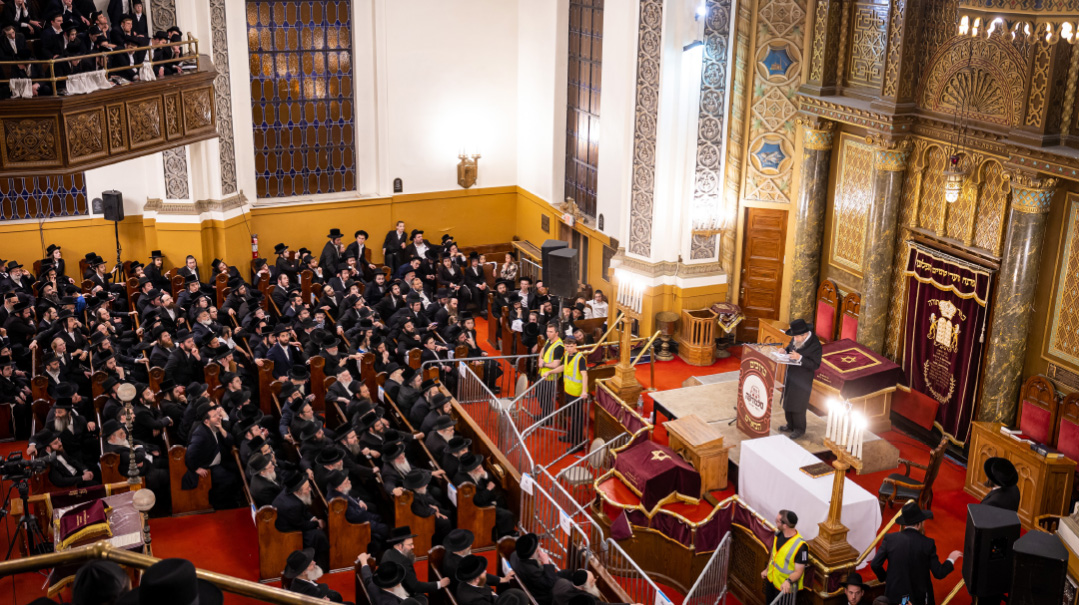
Sunday, June 4
Please, No Fuss
Immediately upon the Rosh Yeshivah’s arrival, he traveled to a chizuk event at Yeshivah of Spring Valley, where he gave the children a brachah that their teachers should reap much nachas from them. He’d altered the regular brachah and didn’t say that their parents should reap nachas, because there are also orphans in the school, and he showed how one needs to be extra-careful not to hurt their feelings.
At the Adirei HaTorah event that night in Philadelphia, he refused to enter alone — he didn’t want anyone making a “matzav” out of him. He even motioned that they remove the special chair they’d prepared, and instead bring the same chair that everyone else was sitting on. He refused to sit until a regular chair was brought.

Monday, June 5
Close the Sefer and Daven
In Passaic, Rav Landau met with Passaic Rosh Yeshivah Rav Meir Stern, who shared a question his own students often ask him: “What is the way to attain ahavas Torah?” Reb Dov was eager to hear this venerated gadol’s answer, and Rav Stern repeated what he’d heard in the name of the Chazon Ish: that by engaging and strengthening one’s commitment to the Yud Gimmel Ikrim (The 13 Principles of Faith), one reaches true ahavas haTorah. Reb Dov then answered, “That’s an idea more suited to angels than people…” He went on to tell how, when the Ohr Someach was perplexed by a difficult sugya he was learning, he would close the sefer and begin to daven — not that Hashem illuminate his mind with understanding, but rather that he should have more ahavas Torah — that if he had more ahavas Torah, then he would merit more understanding.
From there, Reb Dov continued to Boro Park, where Mir Rosh Yeshivah Rav Elya Brudny paid him a visit. Before they met, while Rav Brudny was waiting for Rav Landau, someone approached him and asked for advice on a certain matter; Rav Brudny was taken aback: “We have ruach hakodesh in this house and you’re asking me for advice?
After the two roshei yeshivah spent time delving into a deep discussion in Kodshim and gave each other mutual brachos, Rav Landau went on to deliver a shiur in Novominsk. When he entered, the audience began to sing “Yamim” in his honor, but Rav Landau stopped in his tracks and motioned for them to desist. This happened wherever he went — he didn’t allow anyone to sing in his honor, and only allowed songs of ahavas Torah. Like that same evening in the Bethel shul, where thousands of people crowded in. At the end of the shiur, he asked them to sing songs of simchah for Torah, and the Rosh Yeshivah himself stood and danced for a few long moments while the crowd sang “Toras Hashem Temimah.”
Tuesday, June 6
A Blessing to Change Your Life
Rav Landau visited Yeshivah Darchei Torah in Far Rockaway, where Rav Yaakov Bender filled him in on recent New York Board of Education decisions about manipulating curriculum in order to reach substantial equivalency levels. In light of this, in addition to the tireless efforts by askanim and guided by gedolei Torah, it was suggested that when davening Shacharis in school, in the brachah of Ahavah Rabbah, the children should sing the words with kavanah and plead to Hashem to lift the decree.
The Rosh Yeshivah continued on from there to Yeshivah Gedolah Darchei Torah, whose rosh yeshivah, Rav Shlomo Avigdor Altusky, was there to greet him amid the crowd that had gathered. When Rav Altusky welcomed the Israeli rosh yeshivah, he mentioned how, in Rav Landau’s previous chizuk mission almost two years ago, the Rav had quoted the words of Rabi Akiva Eiger, but stopped in the middle out of concern that he was not quoting the words precisely, and he asked that a Teshuvos Rabbi Akiva Eiger be brought to him so he could check. Rav Altusky added that this left a deep impression on the talmidim of the yeshivah — to see that this gaon in all areas of Torah, including the words of Rabi Akiva Eiger, was asking for a sefer just to double check the accuracy.

Wednesday, June 7
He Was Never Swayed from Emes
The Rosh Yeshivah then traveled to Lakewood, where he delivered a shiur in BMG to thousands of bochurim and avreichim who filled the hall to capacity, and for those who were stuck outside, a live hookup was connected to other batei medrash. Rav Landau proceeded to deliver a long, deep shiur in the presence of the roshei yeshivah and gedolim of the city, and at the end, he gave a hesped for Rav Gershon Edelstein.
“He was a gaon nifla, a tzaddik nifla, a marbitz Torah, and a venerated leader,” Rav Landau said. “His path in leadership was to be firm as a rock, but always in a pleasant manner. That was how he led the klal and that is how he was marbitz Torah, and it’s how he conducted himself in every matter — bein adam laMakom and bein adam l’chaveiro.
“I can testify to it from my younger years in Ponevezh. It was close to 80 years ago — he was still a bochur, but already he was a person of stature, just like he was in his later years. We were younger than he was, but we learned together and everyone was in awe of him, even though he was a bochur. His entire life was about Torah learning, teaching, leading the generation — and all of it with a pleasant and gentle demeanor, yet with straight thinking that could never be swayed and never deviated from emes…”
Rav Landau then paid a visit to Philadelphia Rosh Yeshivah Rav Shmuel Kamenetsky, whom he wish a refuah sheleimah.
Thursday, June 8
The Leaves Protect the Grapes
Today Reb Dov visited the West Side of Manhattan, first to the Cheder of the West Side, and then to the Kollel Yisrael VeShimshon, headed by Rav Don Blumberg. Rav Blumberg told Reb Dov that a few years back, he was presented with a serious end-of-life question regarding a person who was in a state of imminent death and whether there was a halachic obligation to save him. He reminded Reb Dov that he’d traveled to Eretz Yisrael to speak with him, and the Rosh Yeshivah brought him a proof from the Gemara in Avodah Zara about a person who swallowed a bee. Rav Blumberg noted that he looked and didn’t find in the poskim anyone who cited this proof from this Gemara, although the Rosh Yeshivah at the time mentioned it almost casually.
When Rav Landau was about to get into the car and return to Monsey (where he was being hosted by Reb Shimon Glick and family), he was approached by Sgan Rosh Kollel Rav Mordechai Prager. The two became involved in an animated Torah discussion, oblivious to the honking and noise all around, as if Reb Dov had been sitting in his room in Bnei Brak among his piles of seforim, and not in Manhattan amid skyscrapers and congested traffic.
Later that afternoon in Monsey, Rav Landau went outside for some fresh air. As he sat on a chair surrounded by grass and trees, his son, Rav Yossi Landau, remarked that it was interesting that during the day the air was more pleasant than at night. His father turned to him and explained that it was very simple — photosynthesis.
“The trees absorb the sun’s rays and turn it into energy, and then into oxygen. Therefore, during the day the air is fresher because the leaves give off oxygen.” It might be basic elementary school science, but Reb Dov added that it’s mentioned in an obscure passage in the Shu”t Maharit.
The Maharit explained the Gemara in Chulin that Klal Yisrael is compared to a vine, because the clusters of grapes are the talmidei chachamim and the leaves are the laymen. The Gemara says that the talmidei chachamim need to daven for the laymen, because just like the grapes need the leaves to subsist, so, too, the talmidei chachamim need the support of the laymen to subsist. The Maharit explained that the leaves absorb the sun and they cause the grapes to grow and ripen.
Reb Dov then added his own punchline: that this is really connected to his trip to America. He came to strengthen the “leaves,” those who support Torah and cause the talmidei chachamim to grow and to be fruitful in their learning.

Sunday, June 11
It’s All One Language
Today Reb Dov embarked on the flight that would bring him back to Eretz Yisrael. Before takeoff, the Rav declared, “Veyachzor letalmudo!” It was a sign that the trip had come to an end. Indeed, throughout the flight, the plane turned into an animated beis medrash. But at some point the Rosh Yeshivah became pensive.
“You know,” he said, “there are tinokos shel bais rabban in Eretz Yisrael, and there are tinokos shel bais rabban in America. There are Jewish children in Australia and there are Jewish children in France. They speak different languages, they have different lifestyles, but they all learn the same Torah and sing ‘Toras Hashem Temimah’ in the same language.”
Upon his return, Reb Dov was greeted by his dear friend and colleague, Rav Moshe Hillel Hirsch, the other rosh yeshivah of Slabodka, who asked him about his impressions of the olam HaTorah of America. Reb Dov responded, “Sadna d’ara chad — here people are engrossed in learning, there people are engrossed in learning, it’s beautiful to see how remarkably similar the Torah world is everywhere.”
(Originally featured in Mishpacha, Issue 966)
Oops! We could not locate your form.

